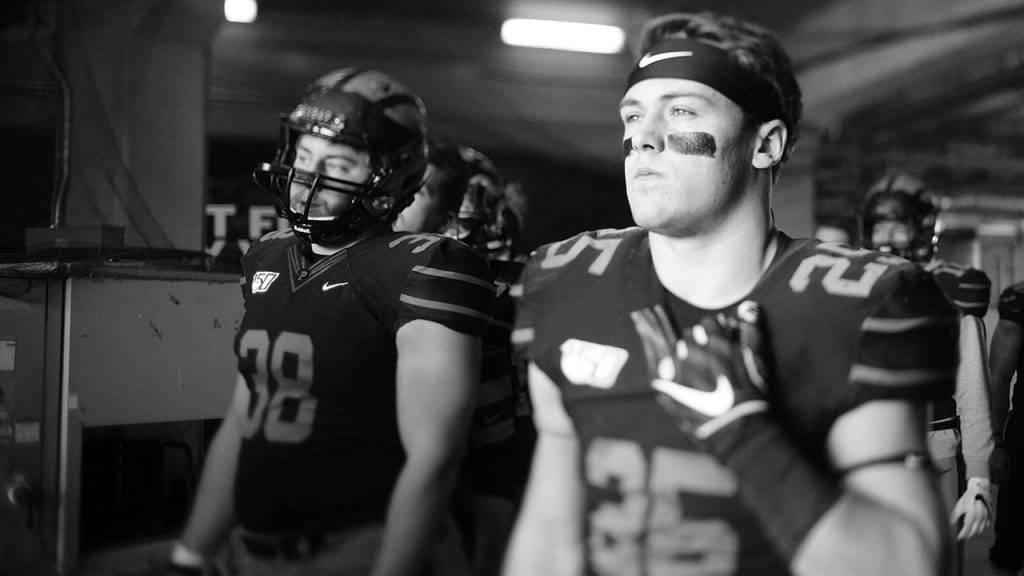The tragic events of New Year’s Eve in New Orleans cast a long shadow over the lives of many, including former Princeton football player Ryan Quigley. Quigley, along with his best friend and teammate, Tiger Bech, became victims of a senseless act of violence that claimed Bech’s life and left Quigley with severe injuries. The attack, which took place on Bourbon Street, resulted in 14 fatalities and numerous injuries, marking a devastating start to the new year for the city and those affected. Quigley sustained broken bones in his leg, back, and face, requiring surgery and an extended hospital stay to begin his physical recovery. Beyond the physical trauma, Quigley also grappled with the emotional devastation of losing his close friend in such a horrific manner.
Amidst this profound grief and the arduous process of healing, a beacon of hope emerged for Quigley in the form of an extraordinary gesture from the Philadelphia Eagles. Recognizing the depth of Quigley’s loss and the significance of his connection to New Orleans, the Eagles extended an invitation for him to attend their divisional round playoff game against the Los Angeles Rams. This initial invitation, a compassionate act in itself, paved the way for a more profound surprise. The team subsequently invited Quigley to their training facility, where they revealed their intention to provide him with tickets to Super Bowl LIX, a game coincidentally scheduled to be held in New Orleans, the very city where the tragedy had unfolded.
For Quigley, the prospect of returning to New Orleans was fraught with complex emotions. The city, once a backdrop for joyful New Year’s Eve celebrations, had become indelibly linked to the traumatic loss of his friend. He had initially vowed never to set foot in New Orleans again, the memories too painful to bear. However, a promise he had made to Bech altered his perspective. Quigley had vowed to take Bech, a Louisiana native, to the Super Bowl if the Eagles made it to the championship game. This promise, now tragically impossible to fulfill in its original form, became a catalyst for Quigley’s decision to return. He resolved to honor Bech’s memory by attending the Super Bowl in his stead, viewing it as a way to reclaim the city from the grip of tragedy and to prevent evil from having the final word.
Quigley’s return to New Orleans for Super Bowl LIX transcended a simple football game; it became a deeply personal pilgrimage of remembrance and resilience. He saw the opportunity not only as a chance to fulfill a promise to his departed friend but also as a platform to share Bech’s story with the world. Quigley’s unwavering determination to keep Bech’s memory alive is a testament to the strength of their bond and a powerful tribute to a life tragically cut short. He views his continued presence as a way to introduce Bech to those he meets, ensuring that his friend’s character and qualities are not forgotten. This commitment to sharing Bech’s story is a central part of Quigley’s healing process and a testament to the enduring power of friendship.
The Eagles’ gesture of providing Super Bowl tickets to Quigley exemplifies the profound impact sports can have beyond the field of play. Their compassion and understanding provided a glimmer of light in a dark time for Quigley, offering him a chance to heal and to honor his friend’s memory in a meaningful way. By facilitating Quigley’s attendance at the Super Bowl, the Eagles demonstrated their commitment to supporting their extended community and acknowledging the human stories that intersect with the world of sports. Their actions serve as an inspiring example of how organizations can use their platform to make a positive difference in the lives of individuals affected by tragedy.
The Super Bowl, typically a spectacle of athletic prowess and entertainment, took on a deeper significance for Ryan Quigley in 2024. It became a symbol of resilience, remembrance, and the enduring power of friendship. Quigley’s journey to New Orleans, a city etched in his memory with both profound loss and the promise of healing, represented a powerful testament to the human spirit’s ability to overcome adversity. His presence at the game, facilitated by the compassionate actions of the Philadelphia Eagles, served as a poignant reminder that even in the face of unspeakable tragedy, hope and healing can emerge. The Super Bowl became a stage not only for a championship game but also for a story of friendship, loss, and the enduring strength of the human heart.

